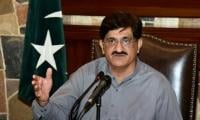ISLAMABAD: The Independent Monitor Board (IMB) has set out its concerns and observations about the less than satisfactory poliovirus situation in Pakistan.
The IMB, which provides an independent assessment of the progress being made by the Global Polio Eradication Initiative in the detection and interruption of polio transmission globally, has recently released its 19th and latest report. The situation in the four provinces is far from satisfactory and a sustained effort is needed to overcome the disease, the report said.
It said that Punjab had remained free of sustained wild poliovirus transmission for more than two years until mid-2018. Lahore has now become the epicentre of this transmission, with continuous detection of positive environmental samples and periodic incidence of polio cases. The sub-optimal quality of campaigns in parts of Lahore, many with migrant Pashtun communities, is largely responsible. It puts Lahore at risk of becoming an endemic reservoir like other provincial capitals that could re-infect other parts of Pakistan.
The report said there is ongoing wild poliovirus transmission in southern Punjab as part of the central Pakistan outbreak, with most cases contributed by Punjab during the last six months. Well-coordinated and intensive response vaccination campaigns are usually effective in stopping these outbreaks. However, the Punjab polio programme needs to give particular attention to sustaining quality in districts with weaker health systems.
The IMB noted that the resurgence of wild poliovirus cases in Pakistan began in the second half of 2018 and peaked in late 2019. It started to decline in early 2020 and then plateaued. At the time of the IMB meeting in July this year, the number of cases was similar to the same time of year in 2019, but the detection of wild poliovirus in environmental samples was higher in 2020 (60%) than in 2019 (47%).
The report said the vaccine-derived poliovirus emergence and outbreak was initially identified in mid-2019 in northern Gilgit-Baltistan (GB). It immediately spread to the adjoining areas of northern and eastern Khyber Pakhtunkhwa (KP), then into the more densely settled areas of the Peshawar valley districts and to southern KP.
The IMB said parts of northern Punjab (Rawalpindi and Gujranwala) were affected by the early spread, and positive environmental samples were detected in August 2019. The bulk of the spread and incidence of cases has occurred in early to mid-2020 in central and southern Punjab and cases have continued to occur through October 2020.
A few sporadic vaccine-derived poliovirus environmental isolates were detected in Karachi and at a site in northern Sindh during late 2019. The increase in frequency of positive environmental samples was followed by detection of cases during the second and third quarters of 2020, the report said.
The outbreak of wild poliovirus cases began in southern KP in April 2019 and continued unabated until early 2020. It was the major source of spread to the rest of Pakistan. In the six months prior to the IMB meeting, 19 of the 29 cases were in southern Punjab and the Quetta block. Only two cases in this period had been reported from KP and three from Sindh.
The report said increases in the proportion of wild poliovirus positive environmental samples in 2020 compared with 2019 have been much greater in Punjab and in Balochistan than in other provinces. During 2019–2020, the bulk of cross-border transmission has occurred across the southern region of Afghanistan and the Quetta block. Cross-border transmission of the southern KP outbreak also continued across southern KP and the south-east region of Afghanistan. There has been much less transmission, particularly in 2020, across the Peshawar/Khyber corridor and the eastern region of Afghanistan.
Outbreak response campaigns to combat vaccine-derived poliovirus were implemented across different epidemiologic zones from November 2019 through to March 2020, the report said. Following a pause of four months due to the Covid-19 pandemic, large scale vaccination campaigns have been conducted across Pakistan during August and October 2020.
The IMB said Sindh was heavily infected by the spread of the polio outbreak from southern KP. From Sindh’s only reported polio case in 2018, together with a few environmental positives from sites in Karachi and northern Sindh, it was plunged into wild poliovirus outbreaks, affecting both central and northern Sindh in 2019. This peaked in December 2019 but continued as a mainly northern Sindh outbreak in 2020. Outbreaks in central Pakistan including northern Sindh, southern Punjab and adjoining districts of Balochistan have been stopped in the past by well-coordinated and intensive outbreak responses. However, gains are seldom sustained in these areas, which are difficult to operate in.
The report said parts of Karachi remain persistent hotbeds of polio. These areas are populated by migrant Pashtun communities from the tribal districts of KP and Balochistan. Refusals and vaccine avoidance behaviour are common. As was clear from the provincial team’s report at the IMB meeting, this resulted in many missed children. Potentially transformative actions aimed at winning over disaffected and mistrustful communities, together with building a coalition of powerful will among political and civil society groups, must be rigorously pursued with determination on a daily basis, not just intermittently.
About Balochistan, the report said, there are huge questions to which the IMB has heard no convincing answers. The IMB considers the jury to be out on whether the political leadership and technical programme capability has the quality to deal with the complexities of the polio context of their province and come out on top.
The report said the IMB was impressed by Special Health Adviser to the Prime Minister Dr Faisal Sultan but said it is important that he has the space to fully understand the complex context of polio in Pakistan. If he is to succeed, it is vital for him to be clear why Pakistan has repeatedly failed to eradicate the disease, and why it is not enough to see it through an infectious disease technical lens.
The IMB remained concerned that Dr Sultan and the head of the National Emergency Operations Centre have very heavy workloads. Without strong national-provincial teamwork, barriers to eradication will endure. This effective leadership role can only work if there are actual visits to the provinces and regular discussions through video conferencing. Where their counterparts at provincial level feel themselves disempowered by local political factors, they need to be able to speak confidentially at short notice to the top federal level to ask for help.
Situation is no different in Pakistan, where climate change-related extreme weather events, including heatwaves and...
According to the Act a political party should submit with the ECP within 60 days from the closure of a financial year
WHO has recommended a comprehensive set of tobacco cessation interventions, including behavioural support delivered by...
PM Shehbaz decided to personally supervise the response to any flood situation
Police and Frontier Corps in a joint raid seized sharp knives and mobile phones from the prisoners







